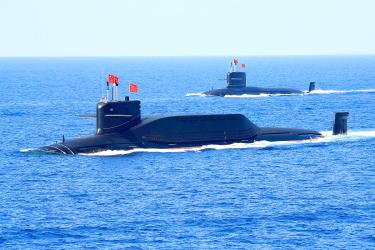China could use force to push Taiwan into unification or into unification dialogue, the Pentagon said in its annual military report on China issued on Thursday.
In the report submitted to the US Congress, the Pentagon said that China is likely to pursue a measured approach by demonstrating its readiness to use force or take punitive actions against Taiwan.
“The PLA [Chinese People’s Liberation Army] could also conduct a more comprehensive campaign designed to force Taiwan to capitulate to unification, or unification dialogue, under China’s terms,” the report said.
Taiwan remains the PLA’s main strategic direction and serves as one of the geographic areas Beijing identifies as having strategic importance, it said.
“China’s overall strategy toward Taiwan continues to incorporate elements of both persuasion and coercion to hinder the development of political attitudes in Taiwan favoring independence,” the Pentagon said.
However, the analysis appeared to downplay prospects for a large-scale amphibious invasion, saying that it could strain China’s armed forces and invite international intervention.
It also noted the possibility of limited missile strikes.
“China could use missile attacks and precision airstrikes against air defense systems, including air bases, radar sites, missiles, space assets and communications facilities, to degrade Taiwan’s defenses, neutralize Taiwan’s leadership or break the Taiwan people’s resolve,” the report said.
Taiwan has much smaller military capabilities than China and the gap is growing, it added.
According to its estimate, China has 2,600 fighter jets, including 1,100 fighter trainers, while Taiwan has only 450.
China also has 450 transport planes, 450 bombers and 150 special mission aircraft, while Taiwan deploys only 30 transport planes and 30 special mission aircraft, and has no bombers, the Pentagon said.
While China speaks of peaceful unification, its government has never given up the use of force as an option and continues to develop and deploy advanced military capabilities, paving the way for a potential military campaign to increase pressure on Taipei, the report said.
In the event of a protracted conflict, China might resort to escalating cyberspace, space or nuclear activities, it said, adding that it might alternatively choose to fight to a standstill and pursue a political solution.
The Pentagon said that the US supports a peaceful resolution of Taiwan-China issues, and under the Taiwan Relations Act, would contribute to peace, security and stability in the Taiwan Strait by providing defense articles and services to help Taiwan maintain adequate self-defense capability.
It added that “Taiwan has stated that it is working to develop new concepts and capabilities for asymmetric warfare.”
Ministry of National Defense spokesman Major General Chen Chung-chi (陳中吉) said in Taipei that the ministry would continue its observations and called on Taiwanese to trust in the military’s resolve and confidence to protect the nation.
The military would treat President Tsai Ing-wen’s (蔡英文) comment that “not an inch of sovereign land will be yielded, nor will we abandon our democracy and liberties” as its prime directive and would establish training regimens accordingly, Chen added.
Additional reporting by Reuters and staff writer
Source: Taipei Times - 2019/05/04





















